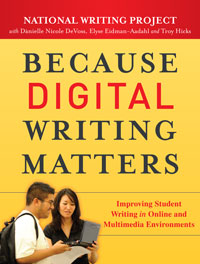Excerpt:
Rather than attempt to cover the long human history of meaning making, however, for the purposes of Because Digital Writing Matters, we define digital writing as compositions created with, and oftentimes for reading or viewing on, a computer or other device that is connected to the Internet. This in itself is a transformation in the ways in which we write. The bigger transformation is, however, the networked ways in which we can share, distribute, and archive digital compositions using Internet based technologies. Today’s network connectivity allows writers to draw from myriad sources, use a range of media, craft various types of compositions representing a range of tools and genres, and distribute that work almost instantaneously and sometimes globally. Michael Crawford, one of Chris Joseph’s interviewees (2005), summed up the new possibilities of digital writing well: “I like to think of it as a totally new place…where one can experience freedom of form and from the boundaries now imposed.” And for Alison Clifford, “The most positive aspect of digital writing has come from the need to re-think writing and how stories are told. Digital writing requires us to think of multiple possibilities and interpretations of events throughout the narrative and perhaps it encourages a more comprehensive way of thinking about the story as a result.”


